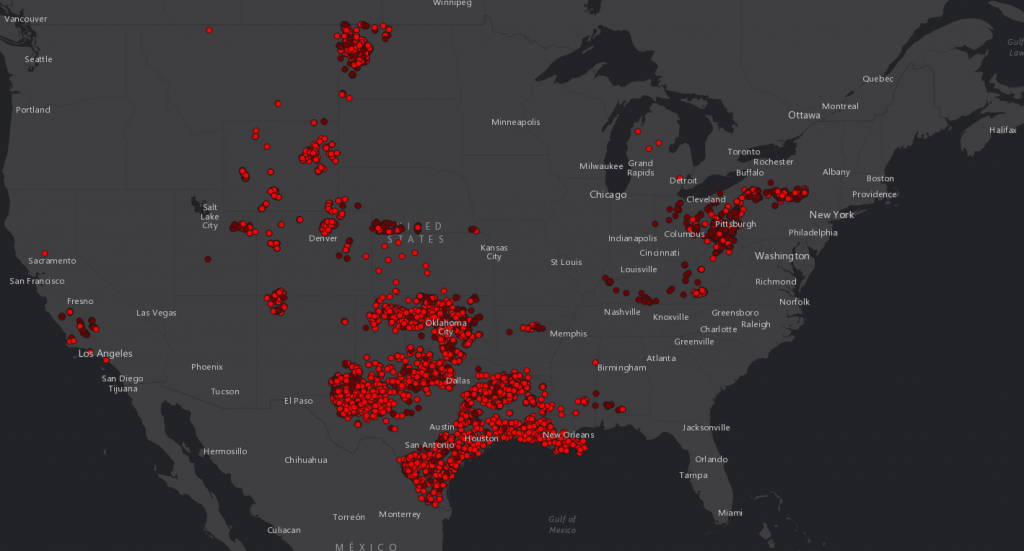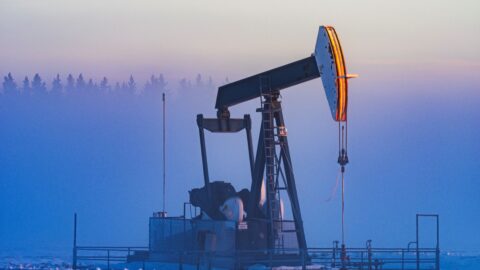Suspension of clean air standards for the oil and gas industry: an urgent health threat for Americans
 Today, Environmental Protection Agency (EPA) Administrator Scott Pruitt officially suspended vital air pollution safeguards that will reduce harmful methane, smog-forming volatile organic compounds and toxic air pollutants like benzene from new and modified sources in the oil and natural gas sector – a move that puts the health and safety of Americans across the country at risk.
Today, Environmental Protection Agency (EPA) Administrator Scott Pruitt officially suspended vital air pollution safeguards that will reduce harmful methane, smog-forming volatile organic compounds and toxic air pollutants like benzene from new and modified sources in the oil and natural gas sector – a move that puts the health and safety of Americans across the country at risk.
EDF, together with a coalition of environmental groups, filed a legal challenge and an emergency motion as soon as the suspension was published.
Our brief asks the U.S. Court of Appeals for the D.C. Circuit to immediately block Administrator Pruitt’s dangerous action from taking effect.
Suspending the standards threatens the health and welfare of Americans who live in close proximity to oil and gas development by allowing thousands of tons of these harmful air pollutants to be emitted into the atmosphere.
Each day this unlawful suspension is in place, the harm is compounded – more new wells are drilled, and other wells subject to the standards are allowed to continue emitting harmful pollution which cannot later be removed from the air.
Administrator Pruitt didn’t bother to identify these impacts before suspending these vital safeguards, nor did he take public input on this action.
Here’s more information on the suspension, and why we felt it was so important to take emergency legal action:
Administrator Pruitt’s actions show an intent to permanently strip away vital health protections
Last year – after years of deliberation and extensive public input – EPA issued long-overdue nationwide standards that require new and modified oil and gas facilities to curb emissions of methane and other harmful pollutants using proven, cost-effective best practices and technologies.
On April 18th, Administrator Pruitt sent a letter to several large oil and gas trade associations notifying them that he would reconsider parts of those standards.
In particular, Administrator Pruitt targeted the leak detection and repair provisions of the rule —requirements that operators inspect for gas leaks at their sites using readily-available technologies like infrared cameras, and then repair any leaks in a timely manner.
These protections against leaks are the cornerstone of EPA’s standards, accounting for up to 45 percent of their entire projected reductions of smog-forming volatile organic compounds, more than 50 percent of their reductions of methane pollution, and approximately 90 percent of their reductions of toxic air pollution.
Administrator Pruitt also alerted the oil and gas trade associations that he would suspend the leak detection and repair standards for 90 days, purportedly while EPA was looking at these provisions.
Then, just a few days before June 3, 2017 — the date by which operators would have had to complete their first inspection — Administrator Pruitt announced that he would issue today’s notice suspending the leak detection and repair standards in their entirety.
That notice was short on details, but did include two important pieces of information that reveal Pruitt’s true intent:
First, it states that EPA will “look broadly at the entire 2016 Rule.”
Second, it invokes the recent executive order which, among other things, directed EPA to “suspend, revise, or rescind” these 2016 standards.
Couple that with the fact that EPA has simultaneously sent to the Office and Management and Budget a proposal to extend, for an indeterminate period, the 90-day stay, and it’s pretty clear what Pruitt’s plans are – to permanently strip away standards designed to protect millions of Americans from harmful oil and gas pollution.
Thousands of polluters avoid taking common sense actions to find and fix leaks
Entirely absent from Administrator Pruitt’s notice today was any attempt to analyze or understand the impacts his suspension of these protections would have on the tens of thousands of Americans who stood to benefit from their implementation.
To support our request to the D.C. Circuit [PDF] to block Administrator Pruitt’s suspension, we did look at the impacts Americans would face – and they are serious.
Analyzing data from a widely-used database of oil and gas wells, EDF scientist Dr. David Lyon determined that more than 18,000 wells across the nation – all of them built or modified since September 2015 – will no longer be required to find and fix leaks during the current suspension.
Of these, more than 11,000 are located in states without any leak detection and repair standards of their own — meaning that, because of Administrator Pruitt’s action, these sources would entirely avoid leak inspection requirements and be free to continue emitting pollution unabated.
If the suspension stands, Dr. Lyon estimates that during the next three months these sources will emit up to an additional 17,000 tons of methane, 4,700 tons of smog-forming volatile organic compounds, and 181 tons of hazardous air pollutants.
Here’s a look at all wells covered by the leak detection standards, and at those wells in states without any state-level leak detection program:

Dr. Lyon’s analysis likely understates the true impact of Administrator Pruitt’s suspension.
For example, Wyoming’s standards only apply in the Upper Green River Basin, and not state-wide. In addition, some states excluded by the analysis have strong state-level leak detection programs, but others – including Utah and Pennsylvania – are substantially weaker than EPA’s. In those areas, the EPA standards would have had meaningful additional benefits, if allowed to take effect.
Also, though based on the most recently available data, most states lack drilling and completion information from the last several months. And right now Baker Hughes reports that there are more than 900 active drill rigs across the country drilling new wells – none of which would be subject to EPA’s leak detection and repair requirements while Administrator Pruitt’s suspension is in effect.
These sources emit harmful air pollution
Ultimately, EPA’s suspension will result in communities across the country facing additional harmful pollution from the oil and gas sector.
EDF Senior Health Scientist Dr. Elena Craft provided information on the impacts of smog-forming and hazardous air pollution.
Ground-level ozone, more commonly known as smog, forms when volatile organic compounds and nitrogen oxides mix in the presence of sunlight. The result is a harmful air pollutant that can have acute respiratory effects and serious cardiovascular impacts. The summer months are often when smog is at its worst.
Dr. Craft found that more than 1,800 wells that will now be allowed to continue emitting smog-forming pollution are located in areas of the country that violate the health-based 2008 smog standards.
During the 2016 smog season, counties with wells that would be required to detect and repair their leaks but for Administrator Pruitt’s suspension had 7,832 moderate days (yellow flag warning), 549 days deemed unhealthy for sensitive groups (orange flag warning), 94 unhealthy days (red flag warning), and six very unhealthy and hazardous days (purple flag warning).
Administrator Pruitt’s suspension, if it’s allowed to stand, lets these and other sources continue emitting smog-forming pollution unabated during – at minimum – the months of June, July, and August. Those are the very months when smog is at its worst and communities are most susceptible to its harmful health effect.
EDF climate scientist Dr. Ilissa Ocko provided information about the harmful effects of additional climate-destabilizing methane emissions from these sources.
Methane is a powerful near-term climate forcer and, through its formation of tropospheric ozone, also contributes to ground-level ozone pollution.
During the time these additional methane emissions remain in the atmosphere, they will have the same 20-year climate impact as more than 300,000 cars driving for one year, or more than 1.5 billion pounds of coal burned.
Once in the atmosphere, there is no available mechanism to remove this climate pollution or reverse its disruptive effects.
Administrator Pruitt’s notice suspending the leak detection and repair requirements doesn’t take any of these impacts into account.
Leak detection standards are common sense and highly cost-effective
In our legal filing today [PDF], we also document the reasonable and highly cost-effective nature of the leak detection standards to underscore the feasibility of allowing the standards to take effect as planned.
The 2016 standards gave operators a year to plan for and complete their initial inspection —time that was provided at the express request of many oil and gas operators.
Many companies are already effectively complying with similar standards in states like Colorado, Wyoming, and California.
Ultimately, as set forth in an analysis by EDF economists Jonathan Camuzeaux and Dr. Kristina Mohlin, the costs of doing common sense leak detection and repair are small. For instance, there are companies that provide these services for $250 per well site. This is a tiny fraction of the average annual revenue produced by the wells covered by Administrator Pruitt’s suspension, which our economists estimate to be approximately $3 million. It’s also negligible when compared to the substantial investment that operators make to drill a new well, which ranges from $4 to $8 million.
There is simply no reason to suspend or rescind leak detection and repair standards on the basis of cost concerns.
The legal basis for EPA’s suspension is unsound
The Clean Air Act provision that Administrator Pruitt relied on to suspend the standards enables EPA to reconsider aspects of rules when parties have not had an opportunity to comment on an issue during rulemaking. That may happen because new data becomes available later, or because an issue is first presented in a final rule.
Only when EPA identifies an issue that meets these criteria does it have the authority to temporarily suspend requirements while it undertakes a reconsideration.
But, as even the American Petroleum Institute recognized in filings with EPA, neither of the issues which EPA has identified for reconsideration meet this legal standard.
In fact, both issues were raised in the proposed rule and extensively addressed in comments to EPA by industry and other parties before the rule was finalized.
Administrator Pruitt’s suspension appears to be clearly pretextual – using flimsy bases for reconsideration as an excuse for wholesale rollbacks of climate and health protections.
This unprecedented and unlawful action by Administrator Pruitt will have clear and immediate public health impacts on communities all over the country that are near oil and gas development – impacts that the Administrator didn’t bother to identify, much less consider.
The suspension of these standards represents another dangerous and unlawful handout from Administrator Pruitt to the oil and gas industry, to the detriment of millions of American with a right to clean, healthy air, and a safer climate.












